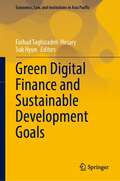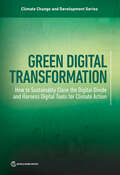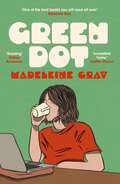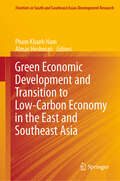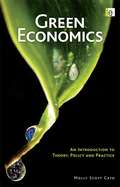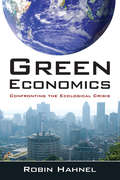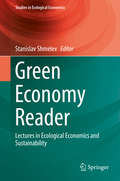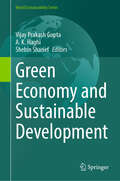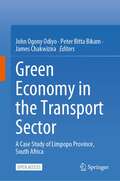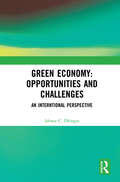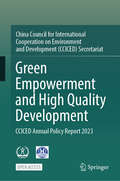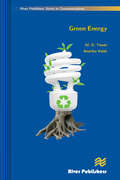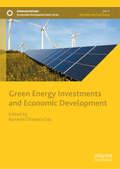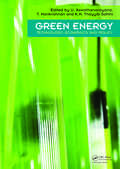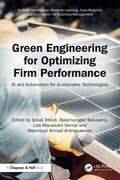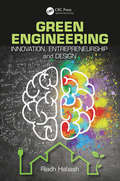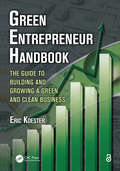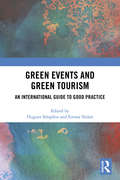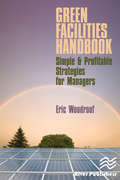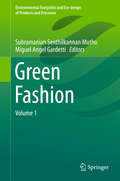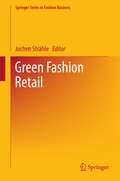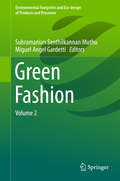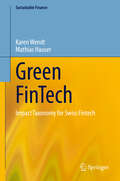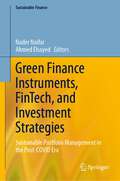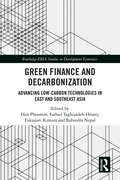- Table View
- List View
Green Digital Finance and Sustainable Development Goals (Economics, Law, and Institutions in Asia Pacific)
by Farhad Taghizadeh-Hesary Suk HyunThis book aims to fill the literature gap on digital instruments and FinTech in enhancing green finance. Technological innovation can increase transparency, accountability, and speed, decentralize the financial system, improve risk management, increase competition, lower costs, improve efficiency, increase cross-sectoral collaboration and integration, and scale up green finance. Artificial intelligence (AI), distributed ledger technologies (DLT) or blockchain, peer-to-peer lending platforms, big data, Internet-based and mobile-based payment platforms, Internet of Things (IoT), matchmaking platforms including crowdlending, tokenizing green assets are potential means to scale up the green finance for achieving the SDGs. The COVID-19 pandemic, the economic downturns, and the uncertainties shrank the new investments in renewable energy projects globally. Low investment in renewable energy projects could threaten the expansion of green energy needed to provide energy security and meet SDG7 and SDG13. Investments in renewable energy projects are scarce because of several risks and a low rate of return. Although several new green financing solutions such as green bonds, green banks, green credit guarantee, carbon taxation, carbon trade, village funds, and community trust funds have been established in different countries, these are insufficient, and alternative ways to finance projects are required. The book provides several high-quality studies on utilizing digitalization, FinTech, financial innovations, and other new technologies to fill the finance gap of green projects to meet the SDG goals. The chapters are written by scholars in diverse countries and regions and include practical policy recommendations.
Green Digital Transformation: How to Sustainably Close the Digital Divide and Harness Digital Tools for Climate Action (Climate Change and Development)
by The World BankClimate change is unfolding amid the greatest information and communication revolution in human history. From e-commerce and social media to smart manufacturing and precision farming, digital technologies have become prevalent in all aspects of economic and social life. Digital technologies also have the potential to shape climate change action. Green digital transformation can help countries adapt e¬ffectively to the impacts of climate change and create greener growth pathways. Doing this means combining a focus on digital transformation and inclusion with a strategic and sustainable use of digital technologies to address climate change. Green Digital Transformation: How to Sustainably Close the Digital Divide and Harness Digital Tools for Climate Action illuminates the channels through which digital technologies intersect with climate change, and it proposes a path to low-emissions applications of digital technologies to help countries mitigate and adapt to climate change.
Green Dot: Shortlisted for the 2025 British Book Awards Debut Fiction Book of the Year
by Madeleine GrayA BEST BOOK OF 2024 IN STYLIST, DAILY MAIL, THE i PAPER, IRISH TIMES, SUNDAY TIMES AND RED SHORTLISTED FOR THE 2025 BRITISH BOOK AWARDS DEBUT FICTION BOOK OF THE YEAR 'ONE OF THE BEST BOOKS YOU WILL READ ALL YEAR' ELIZABETH DAY'BRILLIANT. WHAT A WRITER' NIGELLA LAWSON'INCREDIBLY FUNNY' CAITLIN MORAN'WONDERFUL' GILLIAN ANDERSON'THIS YEAR'S SORROW AND BLISS' DAILY MAILHera is in her mid-twenties, which seems young to everyone except people in their mid-twenties.Since leaving school, she has been trying to kick and scream into existence a life she cares about, but with little success so far.Until she meets Arthur.He works with her, he is older than her, he is also married. But in her soulless office - the large cold room she feels destined to spend her life in - he is a source of much-needed sustenance.And though Hera has previously dated women, she soon falls headlong into a workplace romance that will quickly consume her life.Laugh-out-loud funny, deeply moving and whip smart, Green Dot is a story about the terrible allure of wanting something that promises nothing and the winding, torturous, often hilarious journey we take in deciding who we are and who we want to be.'IF YOU LIKED FLEABAG YOU WILL LOVE GREEN DOT' PANDORA SYKES'YOU'LL TEAR THROUGH THE PAGES' HEAT MAGAZINE'STAGGERINGLY GOOD AND WICKEDLY FUNNY' THE SATURDAY PAPER'THE DEBUT OF THE YEAR' i PAPER
Green Economic Development and Transition to Low-Carbon Economy in the East and Southeast Asia (Frontiers in South and Southeast Asian Development Research)
by Almas Heshmati Pham Khanh NamThis edited volume consists of research in three closely related fields: (i) carbon emissions allowance and market, (ii) green economic development and sustainable finance, and (iii) environmental, social, and good governance. The applications are diverse and cover several countries including China, Indonesia, Vietnam, the region of East and Southeast Asia, and its comparison with those practiced in European Union. The green economic development and transition includes studies of the green-oriented economic development and transition from fossil fuel-based brown economy to low-carbon green economy. The volume provides a comprehensive overview of the application of green economic development and transition to low-carbon economy in different parts of the region. Its unique and empirical insights into the up-to-date approaches, laws, and policies enable countries to undertake the transformation to a low-carbon economy possible. The volume offers practitioners a deeper understanding of the green and carbon economy and challenges faced in their implementation. It presents different approaches and practical examples of how to shape environmental policy to successfully implement a green and low-carbon economy at different levels. It provides analysis of development of regulations and integrated environmental policies for a green economy supported by empirical evidence. The countries in the region have invested heavily in development infrastructure and cooperate to develop in an environmentally sustainable way. This edited volume is written by professionals with good insights into the features of the region’s economy and its green development potential.
Green Economics: An Introduction to Theory, Policy and Practice
by Molly Scott CatoThe world as we know it needs a new economics. Climate change, financial crisis and out-of-control globalization - all the major problems facing the world have their root in the dominant economic system. The globalised marketplace is the prevailing force in our lives, undermining the real importance of our human communities and our planet. Green Economics argues that society should be embedded within the ecosystem, and that markets and economies are social structures that should respond to social and environmental priorities. This highly readable text provides an introduction to green economics including views on taxation, welfare, money, economic development and employment through the work of its inspirational figures including Schumacher, Robertson and Douthwaite. It also explores the contributions and insights of schools of thought critical of the dominant neo-classical economic paradigm, including ecofeminism, views from the global South, and the perspective of indigenous peoples. Examples of effective green policies that are already being implemented across the world are presented, as well as policy prescriptions for issues including climate change, localization, citizens' income, economic measurement, ecotaxes and trade.
Green Economics: Confronting the Ecological Crisis
by Robin HahnelThis book's pluralistic, non-dogmatic, and committed investigation of the values of ecological sustainability, economic justice, and human dignity provides balanced analysis of environmental problems and their potential solutions.
Green Economy Reader
by Stanislav ShmelevState of the art in sustainability thinking, inspired by interdisciplinary ideas of ecological economics. This book is focusing on sustainability pathways, new economic theory, democracy and institutions, multidimensional assessment of sustainability, macroeconomic modelling and policies, climate change and renewable energy, resource flows and circular economy, regenerative cities, environmental conflicts and values. It will be helpful for MSc and PhD students in Economics, Management, Environmental Change, Ecological Economics, Development Economics, Sustainability and practitioners in business, international and nongovernmental organizations. Rich, diverse and thought provoking collection of top level contributions, it will help to facilitate the transition towards sustainability and educational reform. A fabulous composition of papers by the authors who really count! Ernst von Weizsäcker, The Club of Rome The authors present a refreshing perspective on the possibilities of human progress in harmony with nature, without the need for economic growth to secure long term human welfare and wise use of nature's services. Extremely relevant. Peter May, Past President, International Society for Ecological Economics and Professor, UFRRJ, Rio de Janeiro, Brazil The book goes well beyond the Green Economy, offering arguments and blueprints for a complete makeover of the current economic system. With multi- and interdisciplinary contributions ranging from moderately to fundamentally critical of current economics, it raises fundamental questions of value and power, draws on a wide range of theories, opens the eyes for the historical processes that brought about the current crises and demonstrates the value of ecological, but also classical economic thinking to their solution. If better politics require better theories, this is a must read for academics and decision makers in the time of climate crisis. Joachim Spangenberg, Sustainable Europe Research Institute, SERI Germany e. V.
Green Economy and Sustainable Development (World Sustainability Series)
by A. K. Haghi Vijay Prakash Gupta Shebin ShariefThis proposed book explores the intricate world of green and sustainable economy practices within today's business landscape. It offers a comprehensive exploration of the latest developments and applications in areas such as Responsible Consumption and Production, Sustainable Cities and Communities, and Renewable Energy. Drawing from interdisciplinary fields, including environment and economy, the book employs simulation-based models and statistical tools to provide insights and solutions for real-world challenges faced by businesses. This proposed book is especially tailored for postgraduate students, scholars, and researchers in business management and engineering, and this book bridges theory with practical implementation, emphasizing the importance of quality decision-making to foster a conducive business ecosystem and advance sustainability goals.
Green Economy in the Transport Sector: A Case Study of Limpopo Province, South Africa
by John Ogony Odiyo Peter Bitta Bikam James ChakwiziraThis open access book is interdisciplinary and provides cross-sectoral and multi-dimensional exploration of sustainable development and transportation in South Africa. Drawing on work from different disciplines, the book contributes not only to academia but also seeks to inform urban and regional policy with the view of contributing to the national aspirations of South Africa as espoused in the National Development Plan (NDP), 2030, National Spatial Development Framework (NSDF) Draft (2019), National Climate Change Adaptation Strategy (NCASS) Draft (2019), Green Transport Strategy for South Africa (2018–2050), and National Transportation Plan (NATMAP), 2050. Adopting a multi-dimensional assessment, the book provides a background for co-production concerning climate change, sustainable development, and transportation in the Global South. The book contributes in its analysis of the institutional and legislative framework that relates to the climate change, skills and knowledge transfer, sustainable development, and transportation in South Africa, as these are responsible for the evolution of the green economy and transport sector in the country. The connections among different sectors and issues such as environment, transport modes, technology innovation, vehicle management and emission control, skills and knowledge transfer, legislative and policy framework, and the wider objectives of the sustainable development goals (SDGs), especially goals 11 to 13. The success stories relating to climate change, sustainable development, and transportation in South Africa are identified together with the best possible practices that may inform better environmental, urban and regional planning, policy, practice, and management.
Green Economy: An Interntional Perspective
by Ishwar C. DhingraThis book is a conscious effort to discuss the immeasurable environmental damage caused by the human kind and it is by turning these into nature friendly or green as we call them, we can continue to live without any damage to our surroundings. The book has a global approach with an eye on our domestic issues as well. Note: T&F does not sell or distribute the Hardback in India, Pakistan, Nepal, Bhutan, Bangladesh and Sri Lanka.
Green Empowerment and High Quality Development: CCICED Annual Policy Report 2023
by CCICEDThis open access book records major environmental green development ideas based on mainstream of China&’s policy reform collecting from ten major subjects from all study group. It focuses on the progress of China&’s environment and development policies from 2023&’s study accomplishments. It is mainly a reference of providing environmental policy recommendations for policy makers of China and beyond. In 2024, the world economy is still on the way to recovery. Making peace with nature is the only way to get back on the right track of sustainable development. The year of 2023 also marks an important year for China to implement at its 14th Five-Year Plan. As an annual publication, this book is based on the research outputs of CCICED in 2023. Those researches include carbon neutrality, blue economy, collaborative mechanism, watershed management and climate adaptation, BRI green development, sustainable supply chain, sustainable investment, reshaping land use, and innovative technologies for greenhouse gas, etc.
Green Energy (River Publishers Series In Communications Ser.)
by M. D. Tiwari Anurika VaishGreen Energy is increasingly becoming an important component for all individuals and governments of the world. According to Brundtland Commission Report (Our Common Future, 1987) of United Nations states: sustainable development is development that meets the needs of the present without compromising the ability of future generations to meet their own needs. Green Energy is widely considered as Sustainable Energy/ Re-newable Energy which meets the needs of the present without compromising the ability of future generation to meet their own needs. In the global movement of Green Energy Sustainable Renewable Energy, most of the countries decided to be a part of this movement of saving our planet and our future generation. This effort is supported by eleven international authors who are experts in their respective fields. The output is this book Green Energy. This book is comprises of six chapters.The first chapter discusses how global temperature can be controlled with the help of technology. Second chapter explains about green buildings. It explains about costs and benefits of green houses. Third chapter discusses about biofuels. Fourth chapter discusses about technical feasibility of Renewable Electricity Generation in Nunavut. Fifth chapter presents a summary of 15 years of grass root project experience in Partnership with impoverished, remote high altitude communities in the Nepal Himalayas. Sixth chapter argues that, contrary to popular belief, sustainable sources, in particular solar power, are capable of providing allthe energy the Europe needs at reasonable cost.
Green Energy Investments and Economic Development (Sustainable Development Goals Series)
by Ramesh Chandra DasIn an era where economic progress and environmental sustainability must go hand in hand, this book offers an essential exploration of how renewable energy can drive both growth and sustainability. It delves into the pivotal role of green energy investments in achieving the United Nations' Sustainable Development Goal 7 (SDG 7)—ensuring access to affordable, reliable, and sustainable energy for all. With 25 well-researched chapters, the book provides a comprehensive analysis of green energy's impact on economic development, circular economy principles, and productivity of energy resource. Through theoretical models and empirical studies, it presents a cross-country analysis, offering valuable insights for policymakers, researchers, economists, and environmentalists. It highlights the necessity of transitioning from fossil fuels to renewable energy and explores strategies for mitigating climate change through public and private sector collaborations. As nations strive to balance industrial growth with environmental responsibility, this book serves as a vital resource for scholars and decision-makers looking to implement sustainable energy solutions. Whether you are a researcher in economics, environmental science, or social sciences, or a policymaker shaping the future of green development, this book equips you with the knowledge and tools to drive impactful changes.
Green Energy: Technology, Economics and Policy
by U. AswathanarayanaRenewable fuels, such as wind, solar, biomass, tides, and geothermal, are inexhaustible, indigenous, and often free. However, capturing them and transforming them into electricity, hydrogen, or clean transporation fuels often is not. Green Energy: Technology, Economics, and Policy addresses how to approach and apply technology, economics, and
Green Engineering for Optimizing Firm Performance: AI and Automation for Sustainable Technologies (Artificial Intelligence, Machine Learning, Data Analytics and Automation for Business Management)
by Sonal Trivedi, Balamurugan Balusamy, Liza Macasukit Gernal and Mahmoud Ahmad Al-KhasawnehThis book offers a detailed examination of how sustainable technologies are reshaping firm performance. Through an integration of empirical research, expert opinions, and case studies, it explores how green management practices are enhancing business outcomes and contributing to sustainable development. It offers an in-depth understanding of how green technologies and practices, such as green engineering, AI/ML applications, green HRM, and green innovation, impact firm performance. Explores topics such as green engineering, AI/ML applications, green finance, green HRM, and green innovation, showing their collective impact on business performance Presents real-world case studies and empirical findings to demonstrate how organizations across different industries have successfully implemented sustainable technologies Examines regional variations in green management practices, offering insights into the impact of economic, regulatory, and cultural contexts on sustainability initiatives Critically analyzes contemporary challenges with practical strategies for addressing issues effectively Recommends actionable policy and future research directions for sustainable business practices, providing a roadmap for advancing green management This reference book is for academicians, scholars, and practitioners who are interested in emerging technologies that are reshaping firm performance and impacting sustainability.
Green Engineering: Innovation, Entrepreneurship and Design
by Riadh HabashThis is a primary text project that combines sustainability development with engineering entrepreneurship and design to present a transdisciplinary approach to modern engineering education. The book is distinguished by extensive descriptions of concepts in sustainability, its principles, and its relevance to environment, economy, and society. It can be read by all engineers regardless of their disciplines as well as by engineering students as they would be future designers of products and systems. This book presents a flexible organization of knowledge in various fields, which allows to be used as a text in a number of courses including for example, engineering entrepreneurship and design, engineering innovation and leadership, and sustainability in engineering design
Green Entrepreneur Handbook: The Guide to Building and Growing a Green and Clean Business (What Every Engineer Should Know Ser.)
by Eric KoesterWritten by a practicing business attorney with startup experience in the environmental and technology sectors, this comprehensive handbook assists entrepreneurs in tackling the wide variety of opportunities to go green. A one-stop resource for entrepreneurs, it helps readers incorporate clean technology, environmental practices, and green business approaches into the work environment. The book discusses how to sell to utilities, explores fundraising outlets for green businesses, covers government incentives, presents key startup tools aimed at green businesses, and addresses challenges of many new businesses, such as raising money and making sales. Additional resources are available on the book's website.
Green Events and Green Tourism: An International Guide to Good Practice
by Emma Nolan Hugues SeraphinAs the appetite for leisure travel and events continues to grow at an exponential rate, the impact on the environment and local communities is becoming an increasing concern, not least by the users of the services. Green approaches to tourism and events are growing in popularity and present an opportunity to both identify solutions to significant environmental and societal problems and new approaches to business. <P><P>Green Events and Green Tourism looks at key frameworks, guidelines, principles and benchmarks that support the application of sustainability in practice. The five sections of the book cover themes of governance, accreditation, certification, innovation, priorities, trends, ambitions and consumer behaviour, and the chapters include examples of best practice in the organisation of music and arts festivals, special interest tourism, the green management of outdoor sites and the management of sports events. Readers will benefit from insightful case studies from around the globe.
Green Facilities Handbook: Simple and Profitable Strategies for Managers
by Eric WoodroofMeeting a need in the marketplace for information on how to operate a sustainable facility and reduce carbon emissions, the Green Facilities Handbook clearly explains why green business is good business and delineates practical strategies to green your operations in energy and management. The book explores issues in the greening of a facility, including janitorial considerations, fuel choices for fleets, and recycling. Additional information is provided on carbon reduction terminology, monitoring and reporting, and carbon trading as well as offset strategies. Special bonus chapters include valuable information on financing and procedures for “green” marketing.
Green Fashion
by Subramanian Senthilkannan Muthu Miguel Angel GardettiThis book details the crux of green fashion, addressing various environmental aspects and discussing the importance of sustainable fashion in the apparel industry. It addresses various important topics such as Relationship marketing in green fashion, Animal Ethics and Welfare in the Fashion and Lifestyle Industries, Green Flame retardants, etc.
Green Fashion Retail
by Jochen SträhleThis book focuses on sustainability in fashion retail, which is fast becoming the pivot point of future fashion retail strategies. Chapters in the book provide theoretical and practical insight on how going green may positively influence the strategy of fashion retailers and marketers, who have to react to the changing society and customer needs. Structured in four main parts, and based on distinct research questions, readers will be able to dig deep into the individual levers for possible adaptions. It thus provides a solid understanding on how to integrate green aspects into any fashion retailers business model.
Green Fashion: Volume 2 (Environmental Footprints And Eco-design Of Products And Processes)
by Subramanian Senthilkannan Muthu Miguel Angel GardettiThis book details the crux of green fashion, addressing various environmental aspects and discussing the importance of sustainable fashion in the apparel industry. It addresses various important topics such as Relationship marketing in green fashion, Animal Ethics and Welfare in the Fashion and Lifestyle Industries, Green Flame retardants, etc.
Green FinTech: Impact Taxonomy for Swiss Fintech (Sustainable Finance)
by Karen Wendt Mathias HauserThis publication is the first one to develop a global impact taxonomy for FinTechs that aspire to fulfill the SDGs. The transformative arena of impact investing is witnessing significant shifts, through innovation and technology advances and through the emergence ad application of a new global societal contract. Finance and FinTech companies experience an increasing exposure to the evolving landscape of impact investing, the authors have identified an exigent need to construct a standardized Impact Taxonomy for FinTechs. This taxonomy is envisaged to create a uniform system, thereby enabling FinTechs to quantify their impact in a standardized manner. The inherent heterogeneity in the FinTechs industry and the still emergent implementation knowledge on "how to " implement the SDGs, necessitates the development of this taxonomy, which aims to enhance clarity, transparency, and comparability in measuring impacts, thus facilitating informed decision-making for investors, regulators, and the fintech entities themselves. This publication is conceived as an academic response to the specified need, coming up with the first framework of an impact taxonomy. This book explores the impact innovation potential of emerging technologies and machine learning in the FinTech industry from an entrepreneurial perspective. It maps the current initiatives, is substantiating a detailed examination and proposing a framework for a first global Impact Taxonomy tailored to the fintech sector. In the entrepreneurial sphere and analyses and develops strategies for identifying impact on governance and decision making and for managing risk.It provides practical advice on evaluating, strategizing and improving sustainability in the digital asset sector. This book offers a useful guide for finance professionals, entrepreneurs and early-stage investors.
Green Finance Instruments, FinTech, and Investment Strategies: Sustainable Portfolio Management in the Post-COVID Era (Sustainable Finance)
by Ahmed Elsayed Nader NaifarIn the COVID 19 post-pandemic era, sustainable financial systems are increasingly getting the attention they deserve, and policymakers are now moving toward investment and financing decisions based on sustainable development. Green finance plays an important role in mobilizing financial resources and hedging against environmental risk to achieve financially sustainable systems. Moreover, green financial instruments offer viable alternatives for investors and regulators with regard to portfolio management and risk minimization. Over the last few years, financial technology (FinTech) has grown to become one of the most topical areas in the global financial services industry. The development of distributed ledger technology, big data, smart contracts, peer-to-peer lending platforms, biometrics, and new digital has sparked innovation in the financial services industry and the development of new financing and investment strategies. The combination of sustainability and FinTech can help policymakers to achieve ESG targets when making investment and financing decisions. This book showcases a collection of recent advances in green finance and FinTech and explores their impact in achieving sustainable finance, investment strategy-making, and portfolio management. Presenting theoretical frameworks and the latest empirical studies in the field of green finance and FinTech, it offers a valuable asset for academics, professionals, policymakers, regulators, and investors who want to understand in-depth the impact of green finance and FinTech on future investment and financing strategies in the post-pandemic era.
Green Finance and Decarbonization: Advancing Low-Carbon Technologies in East and Southeast Asia (Routledge-ERIA Studies in Development Economics)
by Farhad Taghizadeh-Hesary Fukunari Kimura Han Phoumin Rabindra NepalThis book explores empirical studies and policies related to green finance and low-carbon technology development through country-level case studies and regional analyses across East and Southeast Asia.Contributors explore how countries such as China, Indonesia, Japan, Lao PDR, Malaysia, the Philippines, the Republic of Korea, Singapore, Thailand, and Vietnam are leveraging green finance to advance their energy transitions and pursue carbon neutrality. The chapters examine regional efforts across East and Southeast Asia, with a focus on green technology innovation, green bond ecosystems, and renewable energy investments. By highlighting the role of green finance—including financial instruments, mechanisms, and policy frameworks—the book emphasizes the importance of coordinated efforts in promoting sustainable energy solutions and reducing carbon emissions.With valuable insights into effective practices for achieving global sustainability goals, this book will interest researchers of finance, energy economics, environmental economics, and policy.
